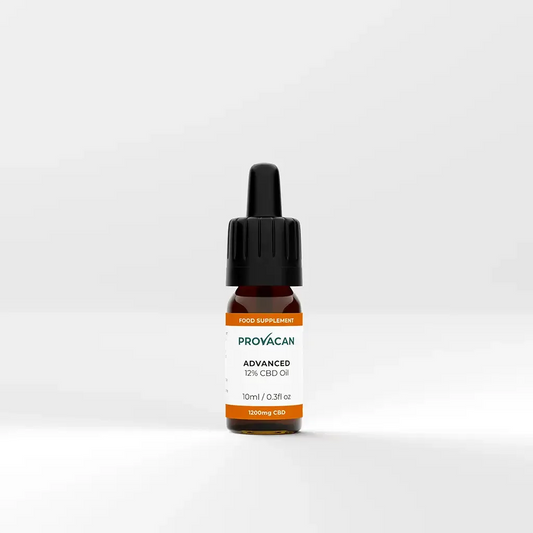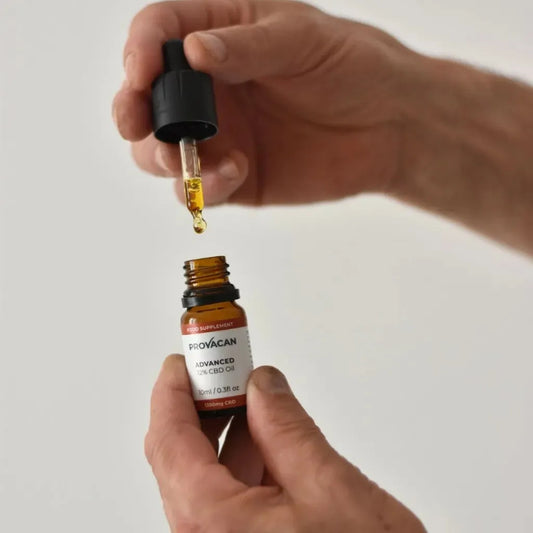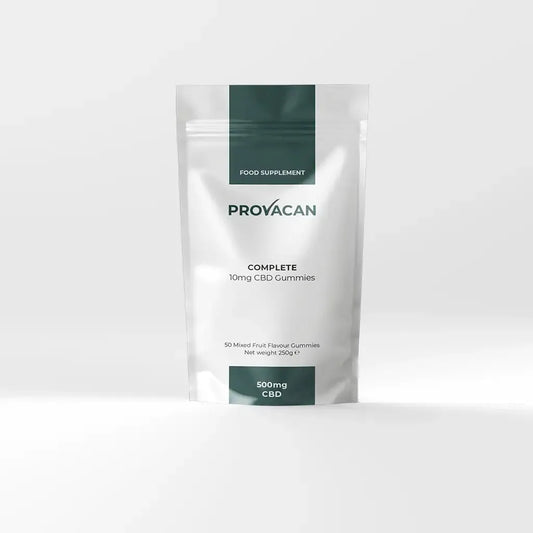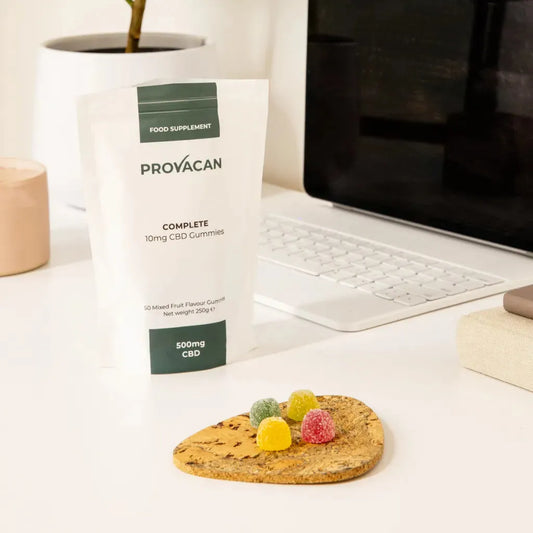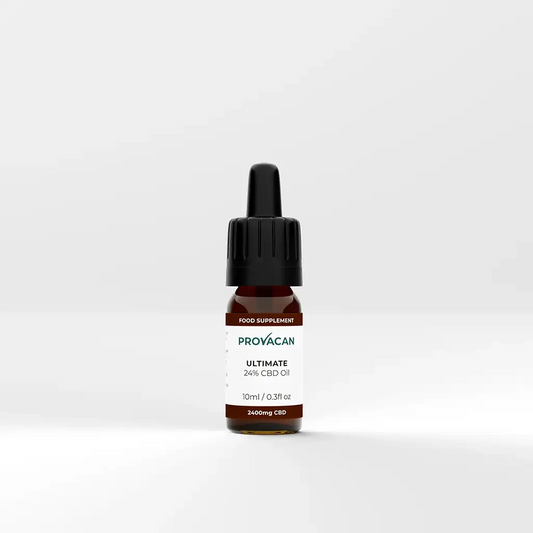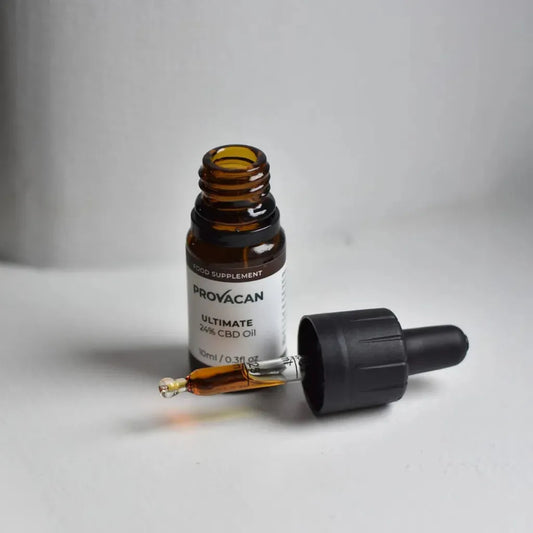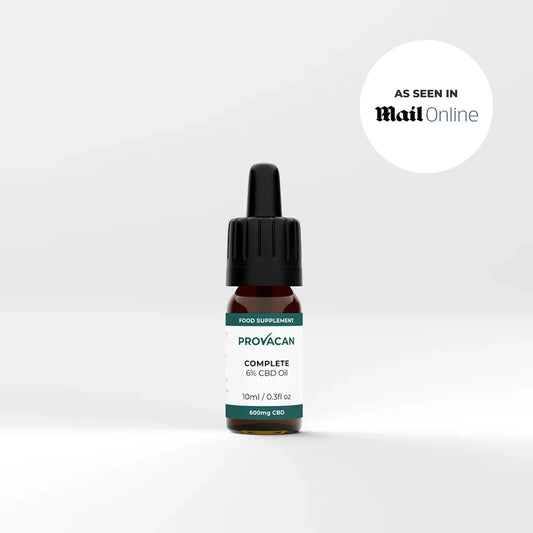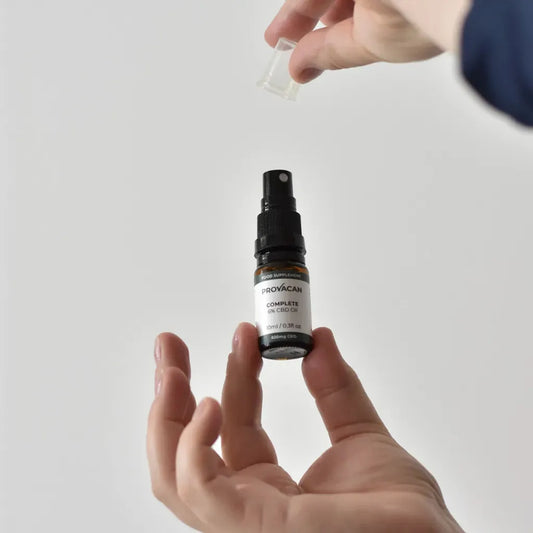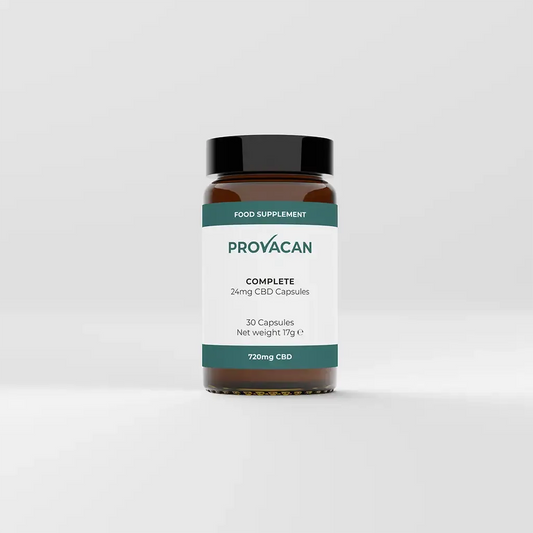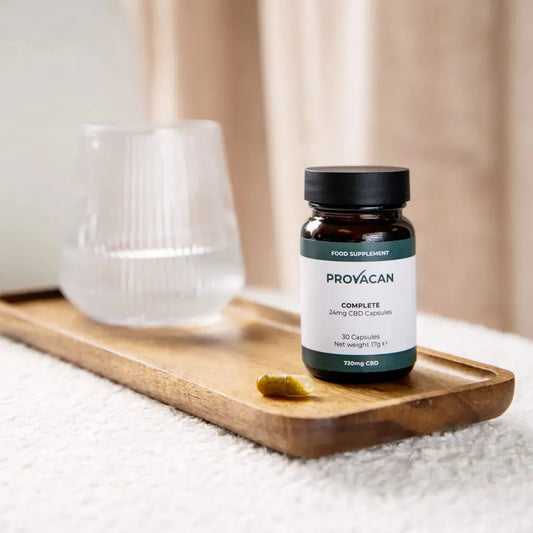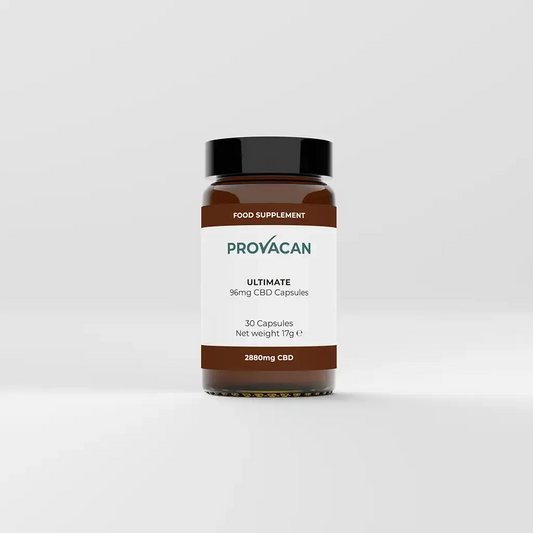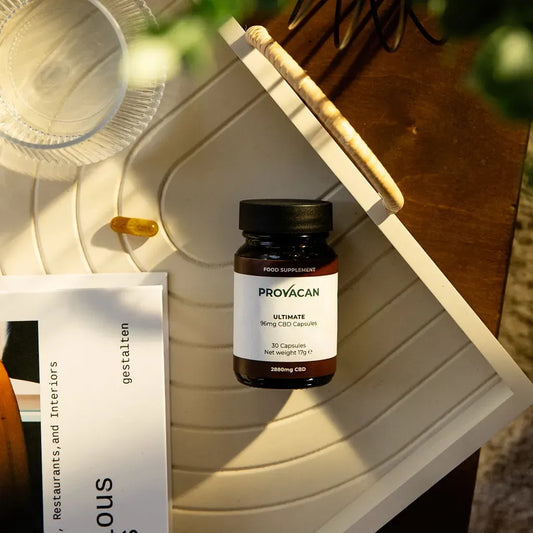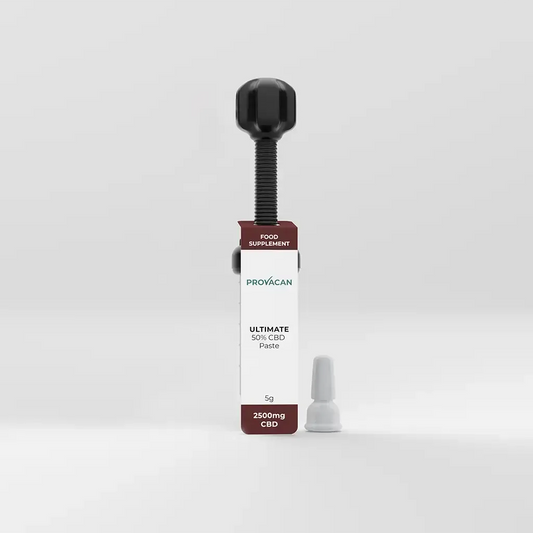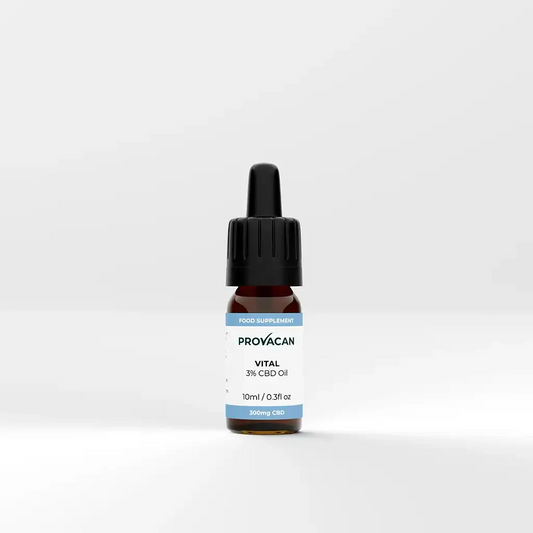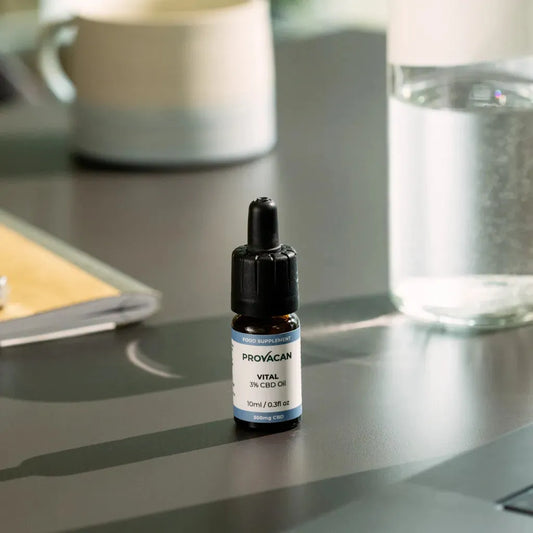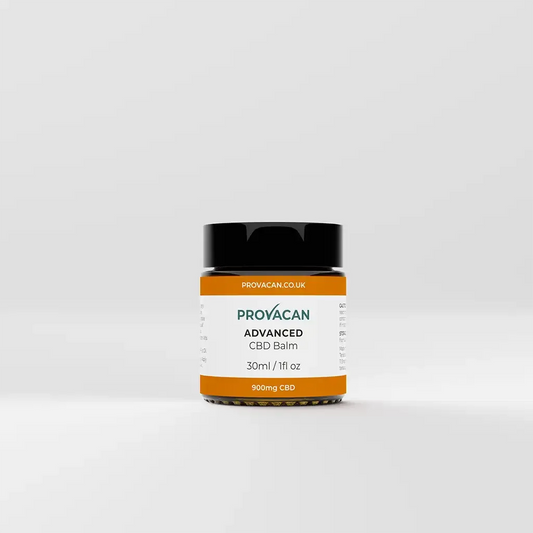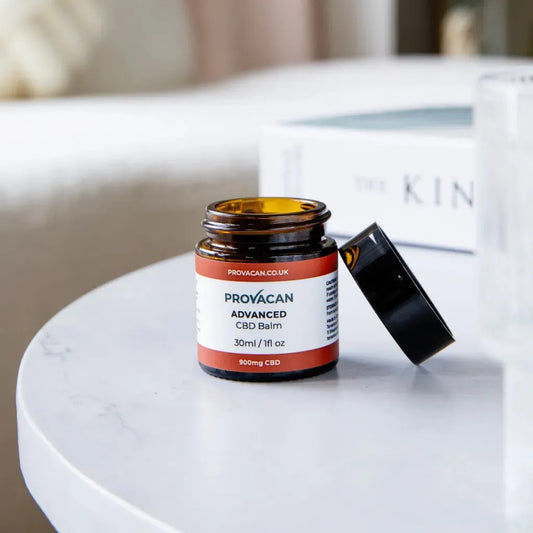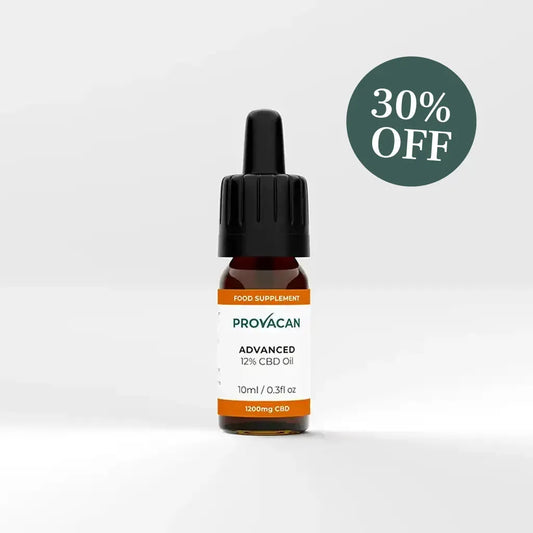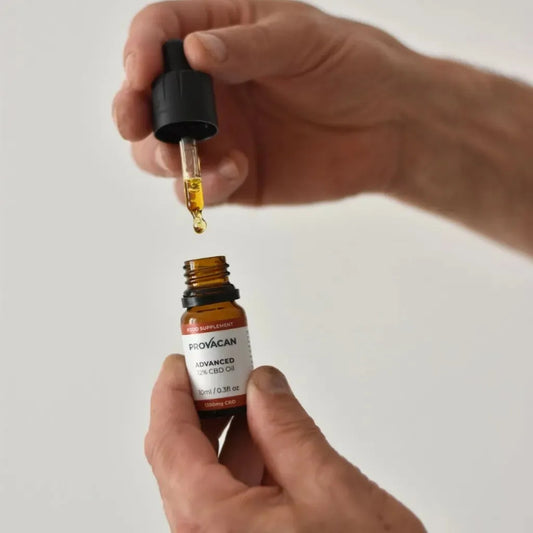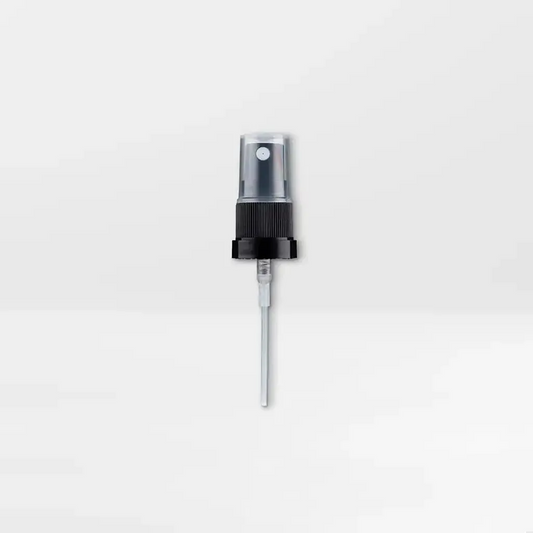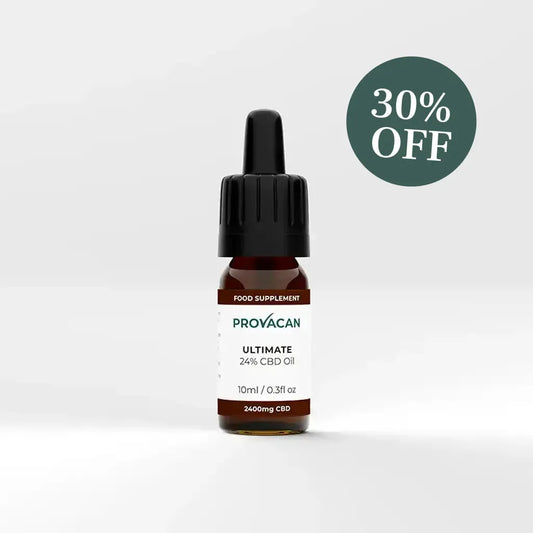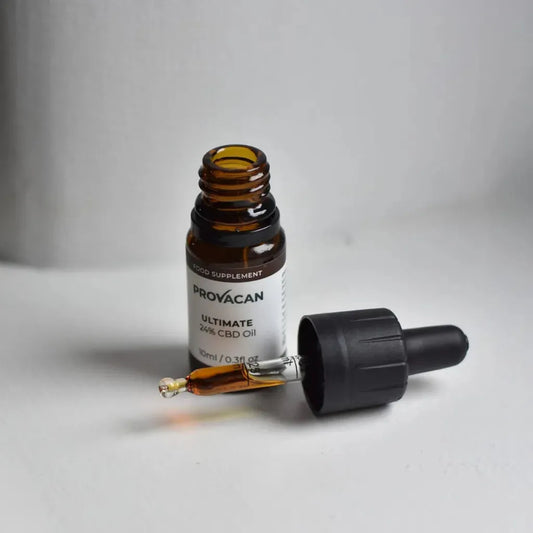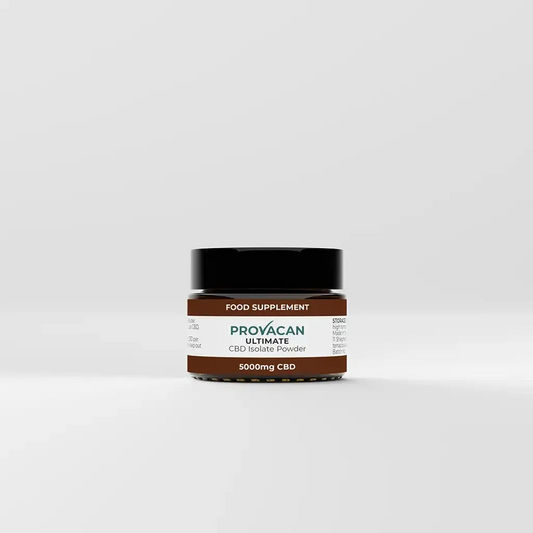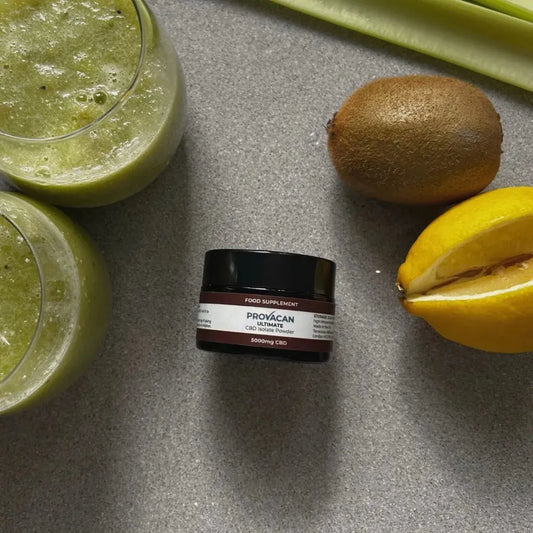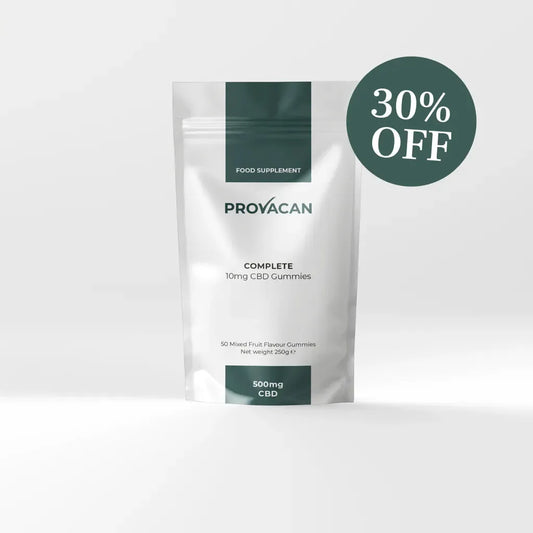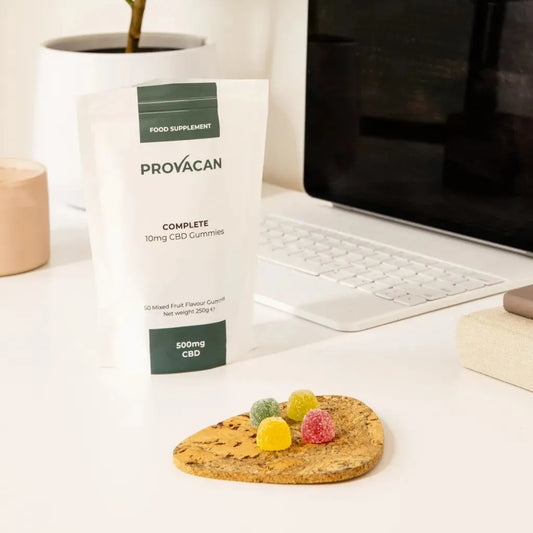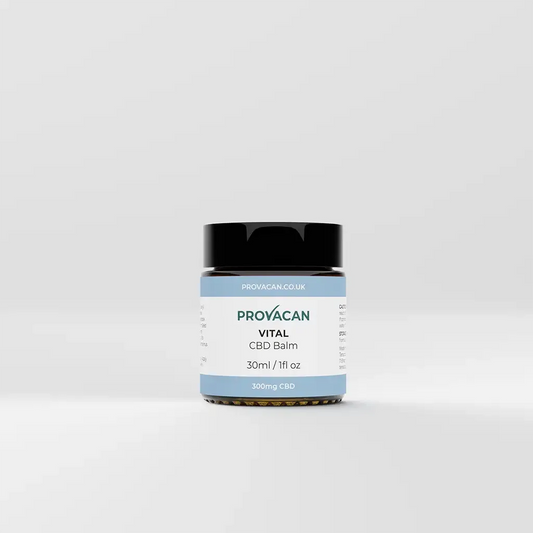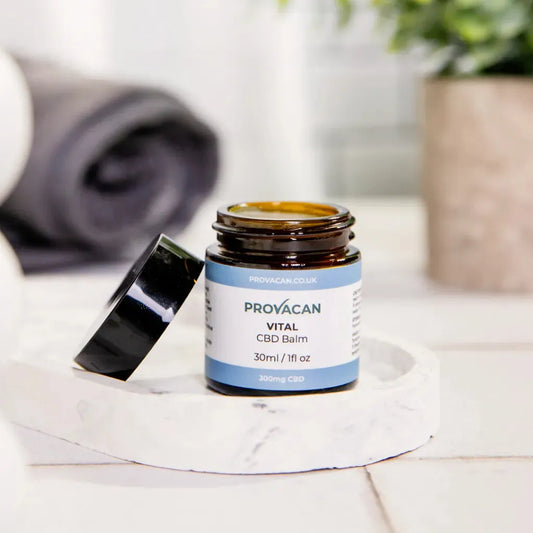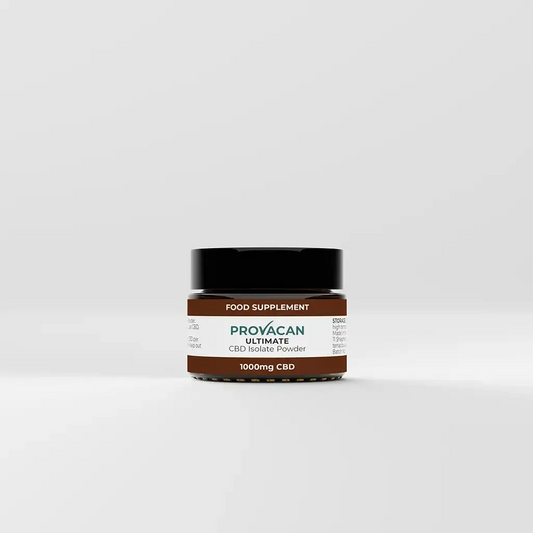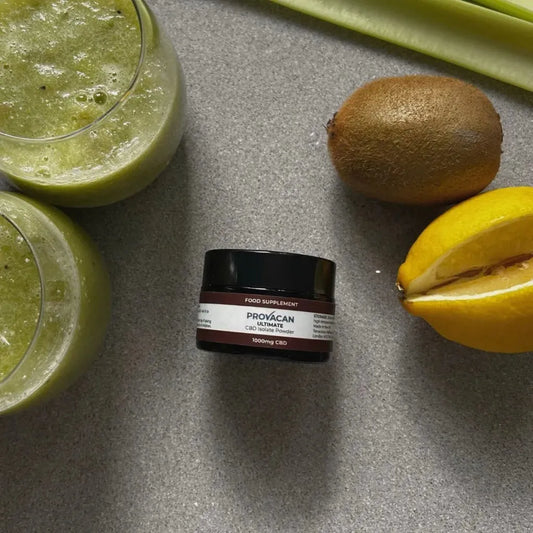Collection: The Impact Of CBD For Depression: A Comprehensive Guide
In today's fast-paced world, mental health issues like depression have become increasingly prevalent, affecting millions of individuals worldwide. While traditional treatment methods such as therapy and medication have proven to be effective for many, some individuals are seeking alternative options that are more natural and holistic. This is where CBD, or cannabidiol, comes into play.
-
Book your free consultation
Get expert guidance on natural ways to support sleep, stress, and more.
BOOK NOW
-
Provacan Advanced CBD Oil | 1200mg / 12% CBD, 10ml
4.7 / 5.0
(213) 213 total reviews
Regular price £49.99 GBPRegular priceUnit price / per -
Provacan Complete CBD Gummies 50 Pack | 10mg CBD per gummy
4.7 / 5.0
(188) 188 total reviews
Regular price £22.99 GBPRegular priceUnit price / per -
Provacan Ultimate CBD Oil | 2400mg / 24% CBD, 10ml
4.7 / 5.0
(164) 164 total reviews
Regular price £79.99 GBPRegular priceUnit price / per -
Provacan Complete CBD Oil | 600mg / 6% CBD, 10ml
4.7 / 5.0
(194) 194 total reviews
Regular price £34.99 GBPRegular priceUnit price / per -
Provacan Complete CBD Capsules | 24mg CBD per capsule, 30 Pack
4.6 / 5.0
(166) 166 total reviews
Regular price £34.99 GBPRegular priceUnit price / per -
Provacan Ultimate CBD Capsules | 96mg CBD per capsule, 30 Pack
4.6 / 5.0
(70) 70 total reviews
Regular price £89.99 GBPRegular priceUnit price / per -
Provacan Ultimate CBD Oil Paste | 2500mg / 50% CBD, 5g
4.7 / 5.0
(265) 265 total reviews
Regular price £89.99 GBPRegular priceUnit price / per -
Provacan Vital CBD Oil | 300mg / 3% CBD, 10ml
4.6 / 5.0
(124) 124 total reviews
Regular price £24.99 GBPRegular priceUnit price / per -
Provacan Advanced CBD Balm | 900mg / 3% CBD, 30ml
4.6 / 5.0
(70) 70 total reviews
Regular price £39.99 GBPRegular priceUnit price / per -
Provacan Advanced CBD Oil | 1200mg / 12% CBD, 10ml - 3 Months Subscription
5.0 / 5.0
(3) 3 total reviews
Regular price £104.97 GBPRegular priceUnit price / per£149.97 GBPSale price £104.97 GBPSale -
Spray Nozzle for CBD Oil
3.5 / 5.0
(8) 8 total reviews
Regular price £1.99 GBPRegular priceUnit price / per -
Provacan Ultimate CBD Oil | 2400mg / 24% CBD, 10ml - 3 Months Subscription
4.5 / 5.0
(6) 6 total reviews
Regular price £167.97 GBPRegular priceUnit price / per£239.97 GBPSale price £167.97 GBPSale -
Provacan Ultimate CBD Isolate | 5000mg / 5g CBD
4.6 / 5.0
(66) 66 total reviews
Regular price £44.99 GBPRegular priceUnit price / per -
Provacan Complete CBD Gummies 50 Pack | 10mg CBD - 3 Months Subscription
5.0 / 5.0
(1) 1 total reviews
Regular price £48.27 GBPRegular priceUnit price / per£68.97 GBPSale price £48.27 GBPSale -
Provacan Vital CBD Balm 300mg CBD / 1% CBD, 30ml
4.5 / 5.0
(4) 4 total reviews
Regular price £22.99 GBPRegular priceUnit price / per -
Provacan Ultimate CBD Isolate | 1000mg / 1g CBD
4.6 / 5.0
(65) 65 total reviews
Regular price £22.99 GBPRegular priceUnit price / per
Key Takeaways:
- The Impact of CBD for Depression Has Been Realized By Many: CBD offers a natural, holistic option that may help manage the symptoms of depression.
- CBD is Non-Psychoactive: CBD does not produce the “high” associated with cannabis.
- Research Shows CBD’s Potential for Treating Many Conditions: While ongoing, research on the properties of CBD has shown promise for treating many different conditions.
Understanding CBD And Its Sources
Cannabidiol, or CBD, is a naturally occurring compound found in the cannabis plant. Unlike its counterpart, tetrahydrocannabinol (THC), CBD is non-psychoactive, meaning it does not produce the "high" typically associated with cannabis use. The therapeutic properties of CBD have drawn significant attention in recent years, particularly in the realm of mental health.
CBD can be derived from both hemp and marijuana plants. Hemp-derived CBD is legally available in the UK and many other countries, as it contains less than 0.2% THC, meeting legal requirements for industrial hemp products. On the other hand, CBD derived from marijuana plants may contain higher levels of THC, which is regulated differently due to its psychoactive nature.
The extraction method used to obtain CBD from the plant material is crucial in determining the quality and purity of the final product. Provacan prides itself on utilizing advanced extraction techniques that ensure the preservation of beneficial cannabinoids while eliminating unwanted compounds. This results in a premium CBD product that offers maximum therapeutic benefits.
It's essential for consumers to be aware of the source of the CBD they are using, as well as the extraction methods employed by the manufacturer. Transparent labeling and third-party testing can provide valuable insights into the quality and potency of CBD products. Provacan prioritizes transparency and quality assurance, making sure that customers have access to detailed information about the origin and composition of the CBD in their products.
Exploring The Link Between CBD And Mental Health
The connection between CBD and mental health has gained significant attention in recent years, with promising research highlighting its potential benefits. One area where CBD shows particular promise is in managing symptoms of conditions like depression.
Depression is a common mental health disorder that can have a profound impact on an individual's quality of life. Traditional treatment options, such as antidepressant medications and therapy, may not always provide complete relief for everyone. This is where CBD comes in as a potential natural alternative that may offer relief for some individuals.
Research suggests that CBD interacts with the endocannabinoid system in the body, which plays a crucial role in regulating various physiological processes, including mood regulation. By influencing the endocannabinoid system, CBD may help balance neurotransmitter levels and reduce symptoms of depression.
One study published in the Journal of Clinical Psychology found that CBD showed promise in reducing anxiety and depressive symptoms in a sample of participants with social anxiety disorder. Another study in the Journal of Affective Disorders reported that CBD exhibited antidepressant-like effects in animal models.
It's essential to note that while these findings are promising, more research is needed to fully understand the mechanisms behind CBD's effects on mental health. As with any supplement or treatment, individuals should consult with a healthcare provider before incorporating CBD into their wellness routine, especially if they are already taking medications for mental health conditions.
Overall, the growing body of research on CBD and mental health indicates the potential for CBD to be a valuable tool in the management of conditions like depression. As always, Provacan remains committed to providing high-quality CBD products crafted with your well-being in mind.
The Science Behind CBD For Depression
Research into the potential benefits of CBD for depression has gained significant traction in recent years. While more studies are needed to fully understand the mechanisms at play, initial findings suggest that CBD may offer promise in managing symptoms of depression.
One key way in which CBD may impact depression is by its interaction with the endocannabinoid system (ECS) in the body. The ECS plays a crucial role in regulating various physiological processes, including mood, stress response, and emotional well-being. CBD has been shown to influence the ECS by interacting with cannabinoid receptors, such as CB1 and CB2, which are found throughout the body and brain.
Furthermore, CBD's ability to promote neurogenesis, the growth and development of new neurons in the brain, is another intriguing mechanism that could contribute to its potential antidepressant effects. Studies suggest that depression may be linked to a decrease in neurogenesis, and CBD's neurogenic properties could help counteract this, potentially improving symptoms of depression.
In addition to its direct effects on the ECS and neurogenesis, CBD's anti-inflammatory and antioxidant properties may also play a role in its potential benefits for depression. Chronic inflammation has been linked to depression, and CBD's ability to reduce inflammation and oxidative stress in the body could help alleviate symptoms associated with depressive disorders.
While these findings are promising, it's essential to note that individual responses to CBD can vary, and more research is needed to fully understand its efficacy and safety for depression. As always, it's advisable to consult with a healthcare professional before incorporating CBD into your wellness routine, especially if you are already taking medications for depression or any other medical condition.
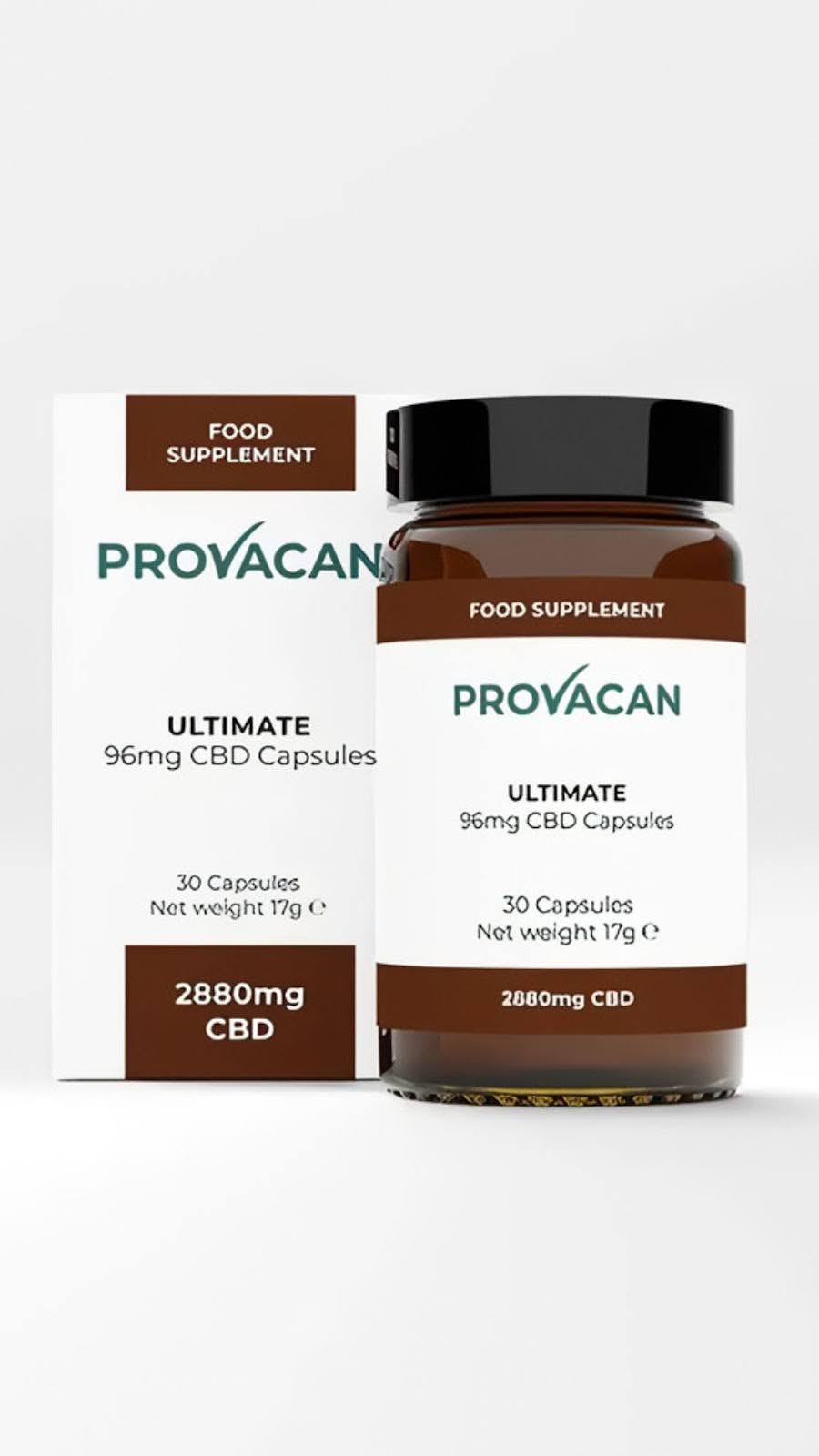
How To Choose Quality Full Spectrum CBD Oil
When it comes to selecting the right full spectrum CBD oil for your wellness needs, it is crucial to be well-informed and discerning. Here are some key factors to consider to ensure you are choosing a high-quality product that meets your expectations:
1. Source of Hemp
One of the most important factors in determining the quality of full spectrum CBD oil is the source of the hemp. Look for products made from organically grown hemp plants. Organic farming practices help ensure that the hemp is free from harmful chemicals and pesticides, resulting in a purer end product.
2. Extraction Method
The extraction method used to obtain CBD from the hemp plant plays a significant role in the overall quality of the oil. CO2 extraction is widely considered the gold standard for producing high-quality CBD oil. This method is clean, and efficient, and preserves the full range of beneficial compounds found in the hemp plant.
3. Third-Party Lab Testing
Reputable CBD manufacturers conduct third-party lab tests on their products to verify their potency and purity. Look for full spectrum CBD oils that have been tested by independent laboratories. These lab reports, also known as Certificates of Analysis (COAs), provide valuable information about the cannabinoid content, terpene profile, and potential presence of contaminants.
4. Transparency and Traceability
Choose a CBD company that values transparency and provides detailed information about their products. Transparency in labelling, ingredient sourcing, and manufacturing processes is essential for building trust with consumers. Additionally, opt for brands that offer traceability, allowing you to track the product back to its source.
By considering these factors and doing thorough research, you can confidently choose a high-quality full spectrum CBD oil that supports your well-being and meets your expectations. Remember, quality should always be a top priority when it comes to CBD products
Comparing CBD To Traditional Antidepressants
When it comes to managing depression, traditional antidepressants have long been the go-to option for many individuals. However, with the rise in popularity of CBD as a potential natural remedy for various health issues, including depression, it's natural to wonder how these two compare.
One key difference between CBD and traditional antidepressants lies in their mechanism of action in the body. Traditional antidepressants work by altering the levels of neurotransmitters in the brain, such as serotonin and dopamine, to help regulate mood. In contrast, CBD is believed to interact with the endocannabinoid system, which plays a crucial role in regulating various physiological functions, including mood, stress response, and inflammation.
Another important factor to consider is the potential side effects associated with each option. Traditional antidepressants can cause a range of side effects, including weight gain, sexual dysfunction, and withdrawal symptoms. On the other hand, CBD is generally well-tolerated and has a low risk of side effects when used in appropriate doses.
In terms of onset of action, traditional antidepressants often take weeks to see noticeable effects, while many users report experiencing the calming effects of CBD relatively quickly after use.
It's essential to note that while CBD shows promise as a natural alternative for managing depression, it is not a replacement for professional medical advice or treatment. It's always recommended to consult with a healthcare provider before making any changes to your treatment plan.
Ultimately, the choice between CBD and traditional antidepressants will depend on individual preferences, sensitivities, and responses to treatment. It's important to weigh the benefits and potential risks of each option to make an informed decision that best suits your needs and overall well-being.
Final Thoughts
In conclusion, the emerging research on using CBD for depression offers promising possibilities for individuals seeking alternative solutions for managing their mental health. While more studies are needed to fully understand the mechanisms behind CBD's effects on depression, the current body of evidence suggests that CBD may contribute to alleviating symptoms associated with this mental health condition.
At Provacan, we are dedicated to providing high-quality CBD products that are crafted with precision and backed by scientific research. Our commitment to excellence in CBD innovation is driven by our passion for customer wellness and our partnership with leading scientists and research bodies. We believe that CBD has the potential to positively impact individuals struggling with depression and other mental health challenges.
Whether you are new to CBD or have been exploring its benefits for some time, Provacan is here to support you on your wellness journey. Our products are designed to meet stringent quality standards, ensuring purity, potency, and effectiveness for our customers. With a focus on research-driven outcomes and a commitment to your well-being.
Read also:
Sources:
- Berger, M., Li, E., & Amminger, G. P. (2020). Treatment of social anxiety disorder and attenuated psychotic symptoms with cannabidiol. BMJ Case Reports, 13(10), e235307. https://doi.org/10.1136/bcr-2020-235307
- Mangoo, S., Erridge, S., Holvey, C., Coomber, R., Barros, D. A. R., Bhoskar, U., Mwimba, G., Praveen, K., Symeon, C., Sachdeva-Mohan, S., Rucker, J. J., & Sodergren, M. H. (2023). Assessment of clinical outcomes of medicinal cannabis therapy for depression: analysis from the UK Medical Cannabis Registry. Expert Rev Neurother, 22(11-12), 995–1008. https://openaccess.sgul.ac.uk/id/eprint/115145/
Collapsible content
Can CBD oil help with depression?
CBD oil has gained attention for its potential to alleviate various conditions, including depression. While research is still in its early stages, some studies suggest that CBD may help by influencing serotonin levels in the brain, a neurotransmitter that plays a key role in mood regulation. Users report feeling more relaxed and less anxious, which can indirectly contribute to alleviating depression symptoms.
Is CBD safe to use for treating depression?
CBD is generally considered safe for most people. However, it can cause side effects in some, such as fatigue, changes in appetite, and diarrhea. It's essential to start with a low dose and monitor how your body reacts. Consult with a healthcare professional before using CBD, especially if you have underlying health conditions or are taking other medications.
How quickly can CBD take effect for depression symptoms?
The onset of effects from CBD can vary depending on the form of CBD used and individual factors like body weight and metabolism. Some people may feel the effects within 30 minutes to an hour when using tinctures or vaping, which are faster-acting methods. However, for consistent relief from depression symptoms, regular use over a period of weeks is often recommended to see the full benefits.
How does CBD interact with other medications for depression?
CBD can interact with various medications, including some antidepressants, by affecting how the body metabolizes these drugs. This can lead to increased side effects or reduced effectiveness of the medications. Always consult a healthcare provider before combining CBD with any other form of medication, including those for depression.
Is there any research supporting CBD use for depression?
There is growing research that suggests CBD could be beneficial for depression. Studies in animals have shown promising results, and anecdotal evidence from users supports these findings. However, more human studies are needed to fully understand the effectiveness and optimal dosages of CBD for depression treatment. Despite the need for more research, the existing findings are encouraging and indicate a potential therapeutic benefit of CBD for managing depression symptoms.
What is the best form of CBD to use for depression?
The best form of CBD for depression depends on individual preferences and how quickly you want the CBD to take effect. Tinctures and oils can be useful for those seeking quick relief and easy dose adjustment. Capsules and edibles may offer a more controlled dose but take longer to kick in. Vaping provides rapid effects but might not be suitable for everyone, especially those with respiratory issues. It's important to choose a high-quality product from a reputable source like Provacan to ensure safety and efficacy.

